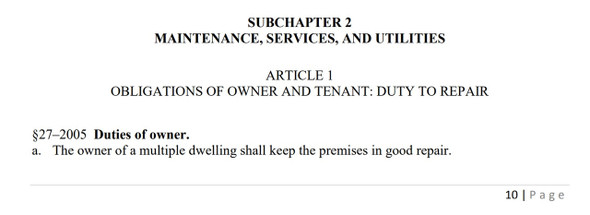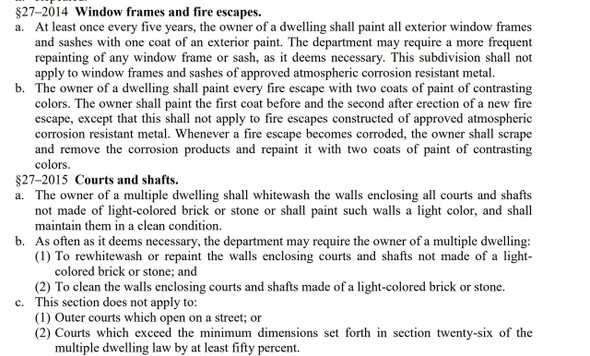- Home
- ** FREE DOWNLOADS FDNY **
- CODE Local Law 152: Periodic Inspection of Gas Piping Systems in NYC (pdf file)
hpdsigns.nyc
CODE Local Law 152: Periodic Inspection of Gas Piping Systems in NYC (pdf file)
- SKU:
- Local Law 152: Periodic Inspection of Gas Piping Systems in NYC
- UPC:
- MPN:
- HPD sample Letter regarding fire safety notice
Description
Local Law 152: Periodic Inspection of Gas Piping Systems in NYC
Overview:
Local Law 152, a critical regulation under the New York City Construction Codes, mandates periodic inspections of gas piping systems in buildings across the city. This law is a direct response to growing concerns about gas safety following several high-profile gas-related incidents in NYC. It aims to enhance public safety by ensuring that gas piping infrastructure is regularly maintained and inspected. The law came into effect on January 1, 2019, and applies to all buildings in New York City, except for those classified as "R-3" (one- or two-family dwellings).
Key Provisions:
-
Scope of Inspection: Local Law 152 requires that all exposed gas piping systems in buildings undergo a comprehensive inspection every four years. The inspection must include all gas piping from the point where it enters the building up to any points of connection to gas appliances, meters, and gas shutoff valves. It also covers any publicly accessible gas piping, such as risers and laterals in multifamily dwellings, but does not include gas piping within individual dwelling units.
-
Qualified Inspectors: The inspections must be carried out by a licensed master plumber (LMP) or an individual working under their direct supervision. Alternatively, a licensed professional engineer (PE) or registered architect (RA) may also perform these inspections if they have relevant gas system expertise. This ensures that the inspection is conducted by professionals with a thorough understanding of gas systems and safety protocols.
-
Inspection Frequency:
- Buildings are divided into four geographical areas of New York City, and each area follows a specific inspection schedule. The law staggered the implementation to ensure that all properties are inspected within the four-year cycle:
- 2020: Community Districts 1, 3, and 10 in all boroughs
- 2021: Community Districts 2, 5, 7, 13, and 18
- 2022: Community Districts 4, 6, 8, 9, and 16
- 2023 and beyond: Community Districts 11, 12, 14, 15, and 17
- Buildings are divided into four geographical areas of New York City, and each area follows a specific inspection schedule. The law staggered the implementation to ensure that all properties are inspected within the four-year cycle:
-
Inspection Report: Upon completing the inspection, the qualified inspector must prepare a report that details the findings. The report must:
- Identify any unsafe conditions, including gas leaks, corrosion, or improper installations.
- List any violations of NYC gas safety codes.
- Recommend corrective actions if necessary.
The report must be submitted to the building owner, who is responsible for maintaining records of the inspection for at least 10 years. In addition, building owners must submit a certification of inspection to the Department of Buildings (DOB) within 60 days of the inspection.
-
Corrective Actions: If the inspection reveals any unsafe conditions, such as gas leaks, the building owner must immediately notify the utility provider (Con Edison or National Grid) and arrange for repairs. Any defects identified during the inspection must be corrected promptly, with critical safety issues addressed on an emergency basis. Failure to comply with the required repairs can lead to gas service shutdown and hefty fines.
-
Penalties for Non-Compliance: Non-compliance with Local Law 152 can result in significant fines and penalties. Building owners who fail to conduct the required inspections or submit the necessary documentation may be subject to penalties of up to $10,000. Additionally, failure to repair any gas system issues can lead to further penalties, including the potential loss of gas service.
Why Local Law 152 Matters:
Local Law 152 plays a vital role in ensuring the safety of New York City's aging gas infrastructure. Many buildings in the city have older gas systems that, if not properly maintained, pose a significant risk to residents. This law provides a structured approach to regular inspections, helping to prevent gas leaks, explosions, and other potentially deadly incidents.
Exemptions:
Certain buildings are exempt from the gas piping inspection requirement, such as:
- Buildings without gas piping.
- Buildings that receive gas service directly from a utility to individual tenant spaces without piping running through public spaces.
In these cases, building owners must file a certification with the DOB stating that their property does not have any gas piping to inspect.
Impact on Building Owners:
The cost of compliance with Local Law 152 varies depending on the size and complexity of the building's gas piping system. Smaller buildings with simpler systems may incur lower costs, while larger multifamily buildings or commercial properties may require more extensive inspections and repairs. However, the potential costs of non-compliance, including fines and the risk of gas-related accidents, make adherence to this law crucial.
Conclusion:
Local Law 152 is an essential part of New York City's broader efforts to improve public safety and prevent gas-related incidents. By requiring regular, professional inspections of gas piping systems, the law helps to identify and address potential hazards before they become life-threatening. Building owners must stay informed of their responsibilities under the law and take proactive steps to maintain the safety and integrity of their gas infrastructure. As the city continues to modernize its building safety codes, Local Law 152 serves as a model for how municipalities can effectively address aging infrastructure and protect their residents.
Legal Disclaimer
Business Representation We are a small, family-owned and operated business based in Brooklyn, New York. Please note that we are not affiliated with, sponsored by, or connected to the City of New York or any of its agencies. The website, products, services, and any hyperlinks found on our website are not endorsed by, approved by the City of New York or any of its agencies, including but not limited to the New York City Department of Housing Preservation and Development (HPD), Department of Buildings (DOB), Department of Transportation (DOT), Department of Sanitation (DSNY), and the Fire Department of New York (FDNY). We are also not affiliated with any federal, state, or local government agencies in any way.
Disclaimer of Legal Accuracy and Timeliness The information, codes, and due dates provided on this website or any related documentation may not be the most up-to-date version. Laws, regulations, and requirements may change, and the information here may not reflect the most current version. It is the user’s responsibility to verify the accuracy, completeness, and adequacy of the information contained on this site or any information linked to government sites. We do not guarantee or warrant the accuracy of the information presented, and we encourage you to check with official sources, such as state or federal agencies, for the most current information.
User Responsibility for Compliance Please note that legal requirements can vary based on your location and intended use of the products or services. It is solely the responsibility of the customer or user to ensure that they are in compliance with all applicable state, federal, local, and municipal laws and regulations. We make no warranty or representation regarding the suitability or sufficiency of the information provided on this website, including its use in compliance with any law.
No Legal or Professional Advice The information provided on this website and in any related materials is intended for general informational purposes only. It should not be interpreted as legal advice, professional advice, or a statement of law. For specific legal guidance or advice regarding your situation, we recommend consulting with a qualified attorney or other professional.
For more detailed information, please refer directly to the applicable laws and regulations for your state, city, and municipality.
Related Products

NYC housing Maintenance Code (pdf file)
hpdsigns.nyc


NYC housing Maintenance Code (pdf file)
hpdsigns.nyc


Self closing door NYC law FLYER (pdf file)
hpdsigns.nyc

Self closing door NYC law FLYER (pdf file)
HPD SIGNS NYC





